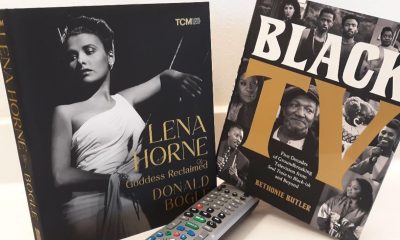Entertainment
Film Review: ‘Get Hard’
By Dwight Brown
NNPA Film Critic
Pairing Kevin Hart and Will Ferrell is like mixing gasoline and fire. You know there’s going to be an uncontrollable explosion. Though Get Hard’s paint-by-numbers script is merely serviceable, and screen writer/turned director Etan Cohen (Tropic Thunder) hasn’t a clue about what he’s doing, the ebony and ivory actors pull this comedy off. They’re so damn funny!
The story commences in two disparate parts of L.A: In upscale Bel Air, James (Ferrell), a millionaire hedge fund manager, is about to marry his super-wealthy boss’s (Craig T. Nelson) shallow daughter (Alison Brie, Mad Men). In the working class neighborhood of Crenshaw, Darnell (Hart) lives with his wife (Edwina Findley Dickerson), a nurse, and young daughter (Ariana Neal). He owns a small carwash/detailing business that operates out of the garage of James’ high-rise office building.
James hardly notices that Darnell is the guy who services his car, until the rich dude is arrested and convicted of fraud. He’s sentenced to 10-years hard time in San Quentin and is scared to death he won’t survive. Assuming the man who washes his car has done time himself, he hires Darnell to teach him how to toughen up for the big house. James is wrong. Darnell is as middle class as the Brady Bunch, but he needs the dough to put a down payment on a new house. It’s on!
Screenwriters Jay Martel and Ian Roberts (both vets of TV’s Key and Peele), with the aid of Etan Cohen, have written a script, in the vein of Trading Places, that is a framework. They probably knocked the whole screenplay out over a game of poker and figured that the two comic actors could fill in the laughs. Cohen, who tries his hand at directing, shows little talent for the job. He sets up the camera, then he falls asleep. Minus some imaginative editing (Michael L. Sale, Tammy) in a staged prison riot scene, the film lacks style. It feels like a half-hour situation comedy that runs on for 100 minutes.
That said, it’s not like Hart or Ferrell care. They work their shtick like champs regardless. Ferrell is arguably one of the best comic actors of his generation, and Hart is the same for his. They improvise this film out of the danger zone and make it an uproarious comedy that will keep you in stitches.
Ferrell’s James is so aloof, naive and caught up in his whiteness that it is a joy to watch him transition from a snob, to a street-smart hoodlum with heart. Darnell tries to butch him up for two-thirds of the movie, but James just doesn’t get it. By the time he catches on, he reels off hostile one-liners like he was a real prison thug. As he pretends to tell off a sexually aggressive con in prison, he warns, “Hope you brought your Costco Card because you are about to get d— in bulk!” Ferrell’s characteristic charm goes a long way.
Hart moves around the set like an impish gazelle. You don’t have time to target him because he is that fast. He uses his self-deprecation, animation, vulgarity and street smarts to play a middle-class man who is pretending to be a hoodlum. Sometimes he is the aggressor in a scene, and sometimes the foil. He punches Ferrell with conviction, and takes a slug from his wife like a wimp. Together Hart and Ferrell are as funny as Laurel and Hardy or Abbott and Costello.
As the story uncovers who stole the money and unravels Darnell’s rouse, it peppers itself with nudity, cursing, violence, racial slurs (derogatory terms for Blacks, Latinos and Jewish people), oral sex, cruising in a gay bar, hoodwinking an Aryan Race gang and gun-toting gang scenes with Darnell’s cousin Russell (T.I.). If offensive humor and situations bother you, stay home.
Check your social consciousness at the door. Forget the formulaic script and lackluster direction. Get Hard features two genius comic actors working their craft like magicians. Hart and Ferrell make this movie raunchy, silly, hysterical and fun.
Visit NNPA Film Critic Dwight Brown at DwightBrownInk.com.
Alameda County
Seth Curry Makes Impressive Debut with the Golden State Warriors
Seth looked comfortable in his new uniform, seamlessly fitting into the Warriors’ offensive and defensive system. He finished the night with an impressive 14 points, becoming one of the team’s top scorers for the game. Seth’s points came in a variety of ways – floaters, spot-up three-pointers, mid-range jumpers, and a handful of aggressive drives that kept the Oklahoma City Thunder defense on its heels.

By Y’Anad Burrell
Tuesday night was anything but ordinary for fans in San Francisco as Seth Curry made his highly anticipated debut as a new member of the Golden State Warriors. Seth didn’t disappoint, delivering a performance that not only showcased his scoring ability but also demonstrated his added value to the team.
At 35, the 12-year NBA veteran on Monday signed a contract to play with the Warriors for the rest of the season.
Seth looked comfortable in his new uniform, seamlessly fitting into the Warriors’ offensive and defensive system. He finished the night with an impressive 14 points, becoming one of the team’s top scorers for the game. Seth’s points came in a variety of ways – floaters, spot-up three-pointers, mid-range jumpers, and a handful of aggressive drives that kept the Oklahoma City Thunder defense on its heels.
One of the most memorable moments of the evening came before Seth even scored his first points. As he checked into the game, the Chase Center erupted into applause, with fans rising to their feet to give the newest Warrior a standing ovation.
The crowd’s reaction was a testament not only to Seth’s reputation as a sharpshooter but also to the excitement he brings to the Warriors. It was clear that fans quickly embraced Seth as one of their own, eager to see what he could bring to the team’s championship aspirations.
Warriors’ superstar Steph Curry – Seth’s brother – did not play due to an injury. One could only imagine what it would be like if the Curry brothers were on the court together. Magic in the making.
Seth’s debut proved to be a turning point for the Warriors. Not only did he contribute on the scoreboard, but he also brought a sense of confidence and composure to the floor.
While their loss last night, OKC 124 – GSW 112, Seth’s impact was a game-changer and there’s more yet to come. Beyond statistics, it was clear that Seth’s presence elevated the team’s performance, giving the Warriors a new force as they look to make a deep playoff run.
Activism
Oakland Post: Week of November 26 – December 2, 2025
The printed Weekly Edition of the Oakland Post: Week of November 26 – December 2, 2025

To enlarge your view of this issue, use the slider, magnifying glass icon or full page icon in the lower right corner of the browser window.
Activism
Oakland Post: Week of November 19 – 25, 2025
The printed Weekly Edition of the Oakland Post: Week of November 19 – 25, 2025

To enlarge your view of this issue, use the slider, magnifying glass icon or full page icon in the lower right corner of the browser window.
-

 Activism4 weeks ago
Activism4 weeks agoOakland Post: Week of November 12 – 18, 2025
-

 Activism3 weeks ago
Activism3 weeks agoIN MEMORIAM: William ‘Bill’ Patterson, 94
-

 Activism4 weeks ago
Activism4 weeks agoHow Charles R. Drew University Navigated More Than $20 Million in Fed Cuts – Still Prioritizing Students and Community Health
-

 Bay Area4 weeks ago
Bay Area4 weeks agoNo Justice in the Justice System
-

 #NNPA BlackPress3 weeks ago
#NNPA BlackPress3 weeks agoLewis Hamilton set to start LAST in Saturday Night’s Las Vegas Grand Prix
-

 #NNPA BlackPress2 weeks ago
#NNPA BlackPress2 weeks agoBeyoncé and Jay-Z make rare public appearance with Lewis Hamilton at Las Vegas Grand Prix
-

 Activism2 weeks ago
Activism2 weeks agoOakland Post: Week of November 19 – 25, 2025
-

 #NNPA BlackPress4 weeks ago
#NNPA BlackPress4 weeks agoThe Perfumed Hand of Hypocrisy: Trump Hosted Former Terror Suspect While America Condemns a Muslim Mayor


























































